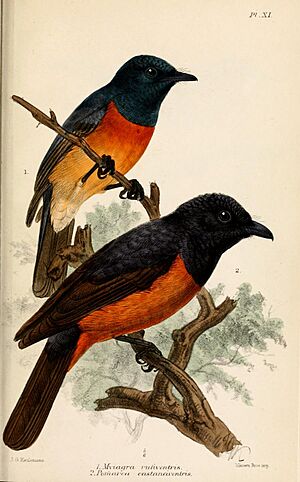Chestnut-bellied monarch facts for kids
Quick facts for kids Chestnut-bellied monarch |
|
|---|---|
 |
|
| Chestnut-bellied monarch (below); illustration by Keulemans, 1879 | |
| Conservation status | |
| Scientific classification |
|
| Kingdom: | Animalia |
| Phylum: | Chordata |
| Class: | Aves |
| Order: | Passeriformes |
| Family: | Monarchidae |
| Genus: | Monarcha |
| Species: |
M. castaneiventris
|
| Binomial name | |
| Monarcha castaneiventris Verreaux, 1858
|
|
| Subspecies | |
|
See text |
|
| Script error: The function "autoWithCaption" does not exist. | |
Script error: No such module "Check for conflicting parameters".
The chestnut-bellied monarch (Monarcha castaneiventris) is a small bird that lives only in the Solomon Islands. This means it is endemic to that area, and you won't find it naturally anywhere else in the world! It belongs to a bird family called Monarchidae.
Different Types of Chestnut-bellied Monarchs
Just like there can be different types of dogs, there are different types of chestnut-bellied monarchs. These different types are called subspecies. They are all the same species, but they might have small differences or live in different places.
There are four known subspecies of the chestnut-bellied monarch:
- M. c. castaneiventris: This group lives on islands like Choiseul, Santa Isabel, Guadalcanal, and Malaita.
- M. c. obscurior: You can find this subspecies on the Russell Islands.
- Makira monarch (M. c. megarhynchus): This type lives on Makira Island.
- Makira monarch (M. c. ugiensis): This one is found on Ugi Island.
How These Birds Change Over Time
In 2009, scientists made an interesting discovery about the chestnut-bellied monarch. They found that some birds in this species had a special genetic change. This change made their feathers look a bit different and, even more surprisingly, made their songs sound different too!
Because their songs and looks changed, these two groups of birds stopped recognizing each other. It was like they were speaking different languages! This meant they no longer chose to mate with each other. When groups of animals stop mating with each other, scientists say they become reproductively isolated.
Scientists believe that if this continues for a very long time, these two groups could eventually become completely separate species. This process, where new species form, is called speciation. It's a real-life example of biological evolution, which is how living things change and adapt over many generations.
 | James Van Der Zee |
 | Alma Thomas |
 | Ellis Wilson |
 | Margaret Taylor-Burroughs |


